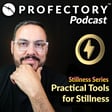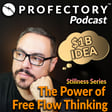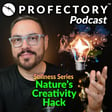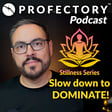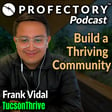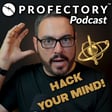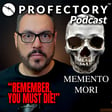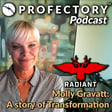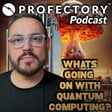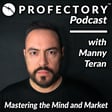Introduction to the Podcast
00:00:05
Speaker
Podcast, Mastering the Mind and Market. Hosted
Focus on Strategy and Growth
00:00:09
Speaker
by Manny Turan, we explore what it takes to succeed both in business and within yourself.
00:00:15
Speaker
From a strategy and business growth to mindset and resilience, we provide the tools to lead with clarity, confidence, and wisdom.
00:00:31
Speaker
Welcome to the Profectory Podcast, Mastering Mind and Market.
The Rise and Fall of 23andMe
00:00:36
Speaker
I'm your host, Manny Turan, and on today's podcast, we are exploring the collapse of one of the most celebrated companies in biotech in recent history, and that, of course, is 23andMe.
00:00:48
Speaker
If you're new to this podcast, we're about helping you to navigate the waters of life and business for those high achievers, those entrepreneurs, those business leaders that need the clarity, need the resilience to push forward.
00:01:03
Speaker
We do this using the stoic philosophy that is embodied by lots of entrepreneurs at many levels, um many of the world leaders, many of the people that command business.
00:01:13
Speaker
Fortune 100 companies are all practicing one form or another of stoicism. And so we break it down. And today's episode is really about what happened to 23andMe.
00:01:24
Speaker
We look at the stoic lessons from the fall of this company, and then ultimately we'll give you some things for you as the leader or entrepreneur, how you can really use this as lessons to navigate your own life and in the end, help to change your
Segment Overview: Lessons from 23andMe
00:01:42
Speaker
mindset. So we're going to be doing this in ah six segments to break it down in ways that are easy to digest.
23andMe's Rise and Bankruptcy
00:01:50
Speaker
Segment one, the rise and fall. 23andMe was founded in 2006 by Ann Wojcicki and was a breakthrough technology company that emboldened and empowered people to understand their identity and what they were all about.
00:02:06
Speaker
I have lots of family members and friends that ah took the test and went through the process and were able to understand better where they're from, understand their roots, ah understand their health, understand if they have some long-lost relative.
00:02:22
Speaker
And these are all things that are very powerful in themselves.
The Data Breach and Its Consequences
00:02:26
Speaker
It's all over the news, and it was something that was definitely a meteoric rise. In 2021, they went public at the valuation of $3.5 billion.
00:02:38
Speaker
At their peak, they were about $6 billion in valuation. So if you can imagine, that was just a few years ago. And if you look at today, March of 2025, they just filed for Chapter 11 bankruptcy.
00:02:53
Speaker
Now, that from 21 to 25, four-year difference, what could have happened? So their stock is worth ah that under $20 million at the current value.
00:03:06
Speaker
That's pretty massive ah fall. So what happened? Well, let's walk it back. In 2023, 23andMe experienced a massive data breach.
00:03:19
Speaker
This was something that shook them to their core. And 7 million customer profiles were compromised. Now, this is people's genetic information.
00:03:30
Speaker
This is not just some random information. This is somebody's life and a way of thinking about it. Not just emails and passwords. We're talking about DNA.
00:03:42
Speaker
And this is something that is worth something in the black market. um The fallout was Swift. The company basically faced massive public outrage, and they didn't really deal with it in an expeditious manner.
00:04:00
Speaker
There was a $30 million dollars class action lawsuit that they they were basically settled, and their stock just plummeted. So all these things combined really led to a lack of trust.
00:04:15
Speaker
If you are spitting in a cup and mailing it off somewhere and getting a result to tell you where you're from or to tell you some genetic disease you might have in in the background, there's a a very high element of trust there.
00:04:29
Speaker
So trust was broken.
Leadership Changes
00:04:31
Speaker
Once that trust was broken, the entire thing become became unraveled. And that really... is what led to the California Attorney General issuing a consumer alert recommending that all users delete their data from the platform.
00:04:52
Speaker
Now, that's a pretty big move from a ah government group to to ask people to do that. And just a few days ago, Wojcicki stepped down as CEO.
00:05:02
Speaker
She will remain on the board and essentially will try to find a buyer that will pick this up literally pennies on the dollar.
00:05:13
Speaker
Now, that really opens a huge door. a conversation or e maybe an argument with the world regarding the data, what happens to the data.
00:05:25
Speaker
And so I'm not going to dive too much into the data side, but I just want to say that that if you are a user of this technology, if you have actually have an account, you may really want to consider your doing something with that data. This is your personal, your DNA.
00:05:41
Speaker
And so be aggressive about that if you need to.
Stoic Philosophy and Business
00:05:44
Speaker
But today's episode is really about the stoic principles that are adjacent to that. So the first of which is the rise and fall.
00:05:53
Speaker
um For all these, you know even in ourselves, we have days we're up and we have days we're down. you know I have a personal experience of having grown a company very quickly.
00:06:04
Speaker
and And it was ah an amazing time. it was a time of a pretty incredible growth. And six years later, i was essentially turning the keys back in.
00:06:15
Speaker
And it was a ah very hard fall. And that hard fall is ah is in part what led me to do this podcast. I did a previous podcast, the Business Trendsator podcast, and I enjoyed it quite a bit.
00:06:27
Speaker
um And I still use a lot of the the technology that i acquired when I did that. And I use some of the mentorship from Adam Hartung, my mentor, one of my mentors.
00:06:39
Speaker
But really, the the the piece that kept on coming up is the personal experience, that those tools that I had to develop or find to get through those moments, the rise and fall.
00:06:53
Speaker
So you're you're up and you're down. And so even though she started this company and and is now putting it away, i have the utmost respect for her and her her courage to do that.
00:07:06
Speaker
um Now, I don't think there was anything unethical about what she's done in the past. The data breach is something that just happened. But you know when we live in in a life of virtue and we're doing our best to live in that life, it should be a celebration.
00:07:21
Speaker
And even though she is Basically took this $6 billion dollars
The Role of 'Memento Mori'
00:07:26
Speaker
company down to 20 million and here we are and it's her responsibility. There's no doubt. As a CEO, as a business leader, it is your responsibility. And when my company fell, I could blame our vendors, I could blame our customers, I can blame my employees or whoever.
00:07:41
Speaker
No, it's all about me as the CEO. And that's the hard thing about so being a CEO. is you carry that weight. You carry that weight of just things like payroll.
00:07:53
Speaker
ah You carry the weight rate weight of insurance documents. Now, you're on the line if something happens. And so I've faced lawsuits. I've faced lots of issues. I've faced...
00:08:04
Speaker
ah issues with HR, with people that are suing me, people that wanted more than I was willing to give. I've had to fire people. But I've also celebrated amazing career growth of my employees.
00:08:20
Speaker
I've helped launch many, many companies from the the basin of my company. Other companies started. And so these are all things that i'm very proud of. And so the whole thing, whether it was Quote, positive or negative is a celebration.
00:08:36
Speaker
And I say quote, positive or negative, because it's all subjective. It's all something that if you think about all the things that I've done in my life, all the things you've done in your life that you think are bad, are they really?
00:08:48
Speaker
Or is it just your mind telling you they are? Segment two, memento mori in business. Memento mori is a stoic principle and Latin phrase that means remember we must die.
00:09:02
Speaker
The idea that we must die is what's given me some kind of the green light to do a lot in business and in life. When I'm sitting on the sidelines and I'm thinking whether I should do something or not,
00:09:15
Speaker
I think about that word, memento mori, and I lean into it. Because we must die. We have a limited time on this earth. We need to really put our best effort in. We're going to make some mistakes. We're going to crack some eggs, if you will.
00:09:29
Speaker
But in the end, it takes that kind of confidence. And that kind of peace, there is a peace to it, to be able to do things and celebrate the failures, quote unquote. Celebrate the fact that you have bruised and you have cut.
00:09:46
Speaker
But in the end, you you forgive yourself, you forgive those the who are against you, and you move forward. If you are in the arena, if you've ever been in the arena, you understand what I mean.
23andMe's Business Model Failures
00:10:01
Speaker
arena is a place of, it's quite a spectacle. There is, and I mean the arena of business, right? And the business in life. There is a lot of things that happen. There's personal relationships that get strained.
00:10:15
Speaker
There's new personal relationships that form. You know, you might be sued. You might have to go bankrupt in your own way, in your in your life, in your personal, in your business. You have issues with vendors, you have issues with with employees, but you also have all these beautiful things like launching careers, like helping your your customers do their thing.
00:10:41
Speaker
And so for my company, my personal experience, I've launched probably a dozen companies through my company, meaning former employees of mine have started my company and they went out and they started their own company.
00:10:56
Speaker
or they they went to some higher level place because of this the time they spent in our organization. I grew my company very quickly from zero to 15 employees in ah and just a few years. And it was quite a meteoric rise and an equally meteoric fall.
00:11:15
Speaker
And i don't i don't really hide the fact of how it happened. I lost track of, I didn't listen to my customers. So just very much the same the way 23andMe failed to listen to their customers and lost trust in from their customers.
00:11:32
Speaker
My issue was I failed to listen to the market. I was digging my heels into a market where it had shifted already. And my that was hubris, right? It was my thing to stand stoic, quote unquote, against what I should have done, which is follow where the market was going.
00:11:52
Speaker
And so that's why why this this podcast is so powerful. Because for me, it is ah really and an eye-opening experience, an exploration of being able to share my experience with the the audience.
00:12:07
Speaker
in the fact that I've been there and I have lots of scars and lots of spoils to share and and to show. And if you haven't been in that in that arena yet, then hopefully this podcast will help to give you that push into that arena because the memento mori, remember we must die, is that green light you need.
00:12:29
Speaker
Now, if we kind of go back to the angle of 23andMe, it wasn't just a data breach. It was that ah that business model that failed.
00:12:40
Speaker
They didn't have something with recurring revenue. You took that you s spit in the cup, you milled off, you paid your money, and it was done. And they tried sort of not very not very powerfully to try to create new angles in the business, new wellness models, new things that to do with their health.
00:12:59
Speaker
um But they didn't really go far enough. And it was kind of an over-reliance in consumer trust. They put all that. And then, of course, when the data breach came, it all came crashing down.
00:13:12
Speaker
It was the hubris, the fact that they believed they were untouchable. And now we've seen that the the they've fallen. And just like all these companies that have these rises, they also have falls.
00:13:26
Speaker
Segment three, the illusion of
Market Realities and Control
00:13:28
Speaker
control. There is a stoic principle called the dichotomy of control, which purports the fact that we can control certain things and we cannot control other things.
00:13:39
Speaker
And it is when we try to control things that have no ability to be controlled, then we have the angst, then we have the anger, the frustration, and all those other things. so So what can we control?
00:13:51
Speaker
We can control our decisions. We can control our actions. We can control how we respond to certain things. We can control our communication. These are all things that within our control.
00:14:05
Speaker
What we can't control is the market. We can't control market shifts or technology shifts. We cannot control our customers or consumers or our competitors or employees.
00:14:20
Speaker
And that's the thing about being the boss is we believe that we need to be in control. that in order to be an effective CEO, we need to be in control so that everything happens the way that we want it to be.
00:14:34
Speaker
And that's when we start to have major issues. When we have major issues internally and we start making bad decisions because we want to be in control and we don't have the full perspective of of the world. So somebody might have a better idea of how to take you to that next place And because you feel like you need to be in control, you silence that conversation.
00:14:58
Speaker
You say, nope, I'm in control. I'm the boss, and you're going to listen to me. I have been there, done that on both sides. I have been in situations where I was working for somebody, and I saw a major pitfall.
00:15:14
Speaker
major. And I warned this person. They were, I think, in a way, they were a mentor of mine. I think we get mentors in in very different places, whether it's a very positive mentor or somebody that that shows you what not to do as well.
00:15:29
Speaker
So this person was in business. I was working for this person long time ago. They were heading down a place where I believed was dangerous and it could really ah bring the company down.
00:15:42
Speaker
And I warned this person that And I warned them again. And the third time, and they kept on saying, no, I got this. No, I got this. Finally, they just said, I'm the boss. You go back to your place. I'm to deal with this.
00:15:55
Speaker
Two weeks later, the company went down. And I'm not saying this because ah you know I'm so awesome. I'm saying this because I believe that it is that bias,
00:16:08
Speaker
that is that hubris, that we're untouchable, that can sometimes lead to the downfall of your company. In this case, 23andMe, they could have prepared better. They could have done better. They couldn't control the hackers. they that's That's a fact.
00:16:26
Speaker
But they could have had a stronger ah process internally to protect the information. There's a lot of things they could have done that would have... save the company. But really, the idea of stoicism is that it prepares us for hardship, knowing the fact that as much as we will rise, we may also and will fall.
00:16:49
Speaker
And so we have to do this with with optimism, with a sense of direction and positive energy, because if you're the boss and you feel like you need to be in control, you're going to have those hit the wall moments.
00:17:04
Speaker
But if you're the boss and you communicate to your staff and your and your community, the fact that this is the leadership, this is where I'm taking this company, but have that open ear, have the ability to to let things flow like water, then you're going to go further faster. And if you really study these really powerful people that um that are very either in politics or business, even though they're they're strong and they're they're driven, they also have a sense of of a really good relationship with control.
00:17:39
Speaker
Now, dictators, it's a different thing, but they too also fall, right? And so the idea with 23andMe is what's the worst that can happen?
00:17:50
Speaker
And are you are we ready for it? And it happened and they weren't ready for it. So we'll see in the next coming months what happens with this bankruptcy. And the idea is if your business is built on data,
00:18:07
Speaker
Wouldn't you make sure that the fortress is impenetrable for that data? And ah wouldn't even call this an accident. I mean, if you look at the Titanic, was that really an accident or was that just misfortune?
00:18:21
Speaker
Was that just hubris on the on the part of the the captain and and the staff? You study the Titanic, you understand that it wasn't just an iceberg that hit. It was a lot more than that.
00:18:31
Speaker
And I think 23andMe has a lot of lessons to share as well. Segment
Key Lessons from 23andMe
00:18:37
Speaker
four, the market does not forgive. Now let's talk about the market. Just like nature, the market does not forgive.
00:18:46
Speaker
It doesn't reward good intentions, but the market does reward value. It does reward adaptability.
00:18:57
Speaker
It does reward trust. And in this example of 23andMe, the trust was broken. They failed to be adaptable.
00:19:08
Speaker
they And then their value basically eroded. So looking at the business model, they didn't create recurring revenue. They failed to do that. And that was the the hubris. That was the fact that they themselves were a disruptive company.
00:19:26
Speaker
They felt untouchable. And then things happened and their revenues began to degrade. And then boom, enter the data breach.
00:19:37
Speaker
And that was a straw that broke the camel's back. It was already going downhill. They have raised a ton of money with their IPO. And when you do that without a long-term vision, you basically have no long-term financial discipline.
00:19:52
Speaker
And that's very clear in what happened in this situation. um The idea that they are... um basically let their database be exploited by hackers, that was something that is beyond me.
00:20:10
Speaker
And i in my experience, when I ran my company, we grew very quickly. And it was my own hubris that thought, well, this is amazing. I'll hire more people. I'll get a big building. I'll keep on building, building, building, building and without really having an eye on the fact that the market could shift.
00:20:27
Speaker
The market did shift. Our customers no longer needed us. We were an an ah external engineering company. We'd come in and support companies in their own um projects, and especially in smaller companies.
00:20:41
Speaker
Well, eventually, they started to bring engineering in-house and need us less. And that was the beginning of the end for me. And these are life lessons that I'm using now to open the door for you so that you won't go into the same place I went to.
00:20:58
Speaker
Now, there's a great quote by Marcus Aurelius. It says, you have power over your mind, not outside events. Realize this and you will find strength. There's a massive amount of power in that statement.
00:21:10
Speaker
because you have power of your mind, not over the world around you. And once you do that, you get the strength. And so bringing it down, 23andMe did not fail because they were hacked.
00:21:27
Speaker
They failed because they didn't control what they could have controlled. And that was their downfall. Segment five, lessons for entrepreneurs and business leaders.
00:21:40
Speaker
Now, I wanted to break down the situation with 23andMe and condense it in a handful of lessons that you can take away from what happened. At Prefactory, we use these case studies like 23andMe, like a more broad version in quantum computing, and we have other ones that we're going to be producing very soon as well.
00:22:00
Speaker
We use these case studies to illustrate real-life examples that, at least in our situation, looking backwards, right, it's almost like a post-mortem. It's an it's an autopsy, but in the hopes that it will help you looking forward.
00:22:16
Speaker
There's a reason why... ah Windshields are this big and rearview mirrors are this big, right? And so for us, this is a great example for tons of of of takeaways.
00:22:30
Speaker
The first of which is trust is your product. Value is embodied in lots of ways. And there's value, there's value delivery. My mentor, one of my mentors at Spark Partners, when I was working with him, is i really came to understand a very clear difference between value and value delivery.
00:22:50
Speaker
Now, part of the value, it's like mixing it mixed in with the value is trust. And there's a great example of the um McDonald's back in the day,
00:23:03
Speaker
They tried to come up with a fancy hamburger. They called it the Arch Deluxe. They hired some chef to come in, some like renowned chef, and he spent months and months developing this new hamburger, right? It was supposed to be higher level, more expensive, and had better ingredients and so forth.
00:23:22
Speaker
And then they ran $200 million dollars ad campaign to go forward and tell people that McDonald's was growing up.
00:23:33
Speaker
even to the fact that Ronald McDonald was playing golf and shunning away kids that were running up to him. And it basically, it eroded the trust that people had in McDonald's.
00:23:45
Speaker
People took their kids to McDonald's. And now this massive ad campaign was telling him that Ronald McDonald was growing up and that he no longer wanted to have the this whole children market.
00:23:59
Speaker
It was ridiculous. The trust was broken. Second thing, memento mori, no company is immortal. We have talked about this in many, many ways at Spark Partners when I was there.
00:24:12
Speaker
And the idea of the fact that GE and Sears and Toys R Us and all these companies that were once really ah foundational in the world, in the market, are now just memories A company like Kodak that was massive, that had this this reach and is now just in ah basically a shell of what it once was.
00:24:39
Speaker
Here again, 23andMe. We'll look back and use this as a case study of a meteoric rise and meteoric fall as well. So this idea of early success, you get arrogant, you get cocky, you think that you're untouchable, you get the Midas touch, and in the end, that's what brings you down. You've got
Actionable Lessons for Leaders
00:25:00
Speaker
to really think about being vigilant and being humble in that situation.
00:25:05
Speaker
Number three, prepare for what you fear most. Now, for 23andMe, they should have protected that data in Fort Knox.
00:25:17
Speaker
It should have been their number one thing they focused on. And the fact that the data breach occurred opened the gate of... damnation.
00:25:27
Speaker
And that was their their end, right? I mean, wasn't that they're already falling, but that was the gate that opened and there was a straw that broke the camel's back and you need to be vigilant, need to stay on point.
00:25:39
Speaker
And it was their Achilles heel. They should have diversified their revenue streams way before any of that happened. and they didn't. They had all that money and they went a mile deep, inch wide.
00:25:55
Speaker
They should have spread out more, spread the revenues, come up with some recurring revenue, and we wouldn't be talking about this right now if they would have done that.
00:26:04
Speaker
Number four, you are not your valuation. So their $6 billion dollar valuation is meaningless because now they're worth $20 million.
00:26:16
Speaker
right There's so many companies that had this massive valuation that ultimately failed to stay aligned with their value, did not shift when the market shifted.
00:26:28
Speaker
they were They were basically proud to the fact that they had risen to this amazing valuation. And by doing so, they shut down so many opportunities.
00:26:42
Speaker
So we need to be humble. Just like... We as people need to be humble. Companies need to also be humble. And that humility comes with oh really opportunities, open doors.
00:26:55
Speaker
And those doors are closed if you're proud. If you're proud that we're so powerful, we were we're so we're worth $6 billion, dollars you're proud of that, then you forsake opportunities for going in a different direction, for adding new revenue, which what they should have done, and they did not.
00:27:13
Speaker
So they fell in love with their their own image, and they fell for it. And number five, adapt like it's life or death. And in this case, it was death.
00:27:26
Speaker
They did not adapt. You need to adapt. the adaptation The adaptability in business is so critical. And I've seen hundreds of examples in companies that I know personally of the founders or the leadership digging their heels in because this is what we've always done things.
00:27:47
Speaker
Or this is my grandfather's company and he would never go in this new direction. Well, what they fail to see is that grandfather back in the day went a new direction from what was there already.
00:28:00
Speaker
It's sad. It's sad this adaptability isn't more ingrained in our business ver vernacular. It is not. It is something that I've had to learn and i am currently running a company where we are dealing with this and we're moving in a new direction because we have to.
00:28:19
Speaker
You have to adapt or ultimately you are going to be the last buggy whip company. you know Just think imagine 130 years ago, there was tons of companies that made buggy whips. Now there's maybe three in the whole world.
00:28:36
Speaker
you don't want to be that You don't want to be that company. You don't. You want to be a company that i realizes that, oh, there's automobile coming. let's We better think about putting the buggy whip technology away or that part away.
00:28:49
Speaker
And let's focus on these tires. What are these things called tires? And so you need to move in that new direction and adapt, right? It's part of business. And so I think that these these lessons need to be learned and ideally learned before you make them yourselves, these these mistakes yourselves, because ultimately they can cost you your entire company.
Final Thoughts on Trust and Integrity
00:29:15
Speaker
Segment six, a stoic call to action. We live in a data-driven market, and trust is currency. And you may not be running a genomics company. You might have a logistics or a real estate company or a corner coffee shop or a software company.
00:29:34
Speaker
But in the end, trust is currency. Protect your brand. Now, that the brand-trust relationship, if you think about what it is, your trust, the trust that the consumer has in you, goes through the brand.
00:29:52
Speaker
right The brand is the keyhole. That trust goes in through the brand. And so a company like 23andMe, they failed to protect their data.
00:30:03
Speaker
That led to lots of spiraling situations where they ultimately failed. Now they're filing for bankruptcy. And that was fundamentally because they lost their trust.
00:30:14
Speaker
And remember that... When you communicate who you are to the world, it's through your brand. I mentioned the McDonald's situation in the last segment. They were able to recover, but it was at a substantial cost.
00:30:35
Speaker
We're talking hundreds and hundreds of millions of dollars that they paid out, plus hundreds and and hundreds of millions of dollars of lost revenues. So we're the you know probably talking about a billion-dollar mistake.
00:30:48
Speaker
Or when Microsoft developed the Kin, which was a competitor to the iPhone, they spent a billion dollars to develop it, but they didn't really listen to the customers. They didn't listen to what the market was doing.
00:31:02
Speaker
And they ended up pulling it from the shelves three months after they put it on the shelves. So that they trust, got beaten up, but they were able to recover. Other companies, smaller companies, companies like 23andMe with a singular product, when that trust was broken, it was gone.
00:31:20
Speaker
So ask yourself, am I exposed? Are there elements in my value chain that I'm not looking at that can lead to my demise? that are Are there elements that are untrustworthy of how I'm showcasing my brand?
00:31:40
Speaker
Am I um assuming things that aren't true? Now, bias is a very, very dangerous thing. Incorporating ah things around your business, your inner circle that reduce bias are only going to help you.
00:31:55
Speaker
And in the case of making these assumptions, bring in outside people to see if if they can any see any issues, any chinks in the armor. Bring them in and listen to them. It's a big deal.
00:32:08
Speaker
And then lastly, what are you doing today to to keep and to honor and to strengthen your relationship with your customers, that trust? Are you actively engaged in improving the trust?
00:32:23
Speaker
And that isn't just necessarily a messaging from your marketing side. That also means creating excellent products. Because if you are in the business of producing things like tablets,
00:32:38
Speaker
You wanna make sure that these tablets are meeting the needs of your consumers, and as the market shifts, you're meeting the needs of that new consumer. In the case of this tablet,
00:32:51
Speaker
This is an older version, but the next one will definitely have AI sewn into it. The next one will have better and more capable Wi-Fi and cell situation.
00:33:02
Speaker
And so they're adapting just like I am adapting as a consumer. So ask yourself, are you prepared for that? And then something else a keep to keep in mind, as leaders, we don't just build an overnight success.
00:33:21
Speaker
overnight. Let me break it down. Overnight success is never overnight. Overnight success takes months and months and years and years of development in place.
00:33:32
Speaker
And we don't just build this overnight, but it can be taken away overnight. That's the crazy thing. You come in just like Anne and her team, they built this in 2006.
00:33:46
Speaker
But they were working on this for years before that. So we're just we'll just say a good 25 years they've been working on this behind the scenes. And in the course of probably two or three years, it became unraveled.
00:34:02
Speaker
from their losing revenue in the four or five years ago to this data breach to now, it's clear to see that they they lost their way.
00:34:14
Speaker
And use that as as an example for yourself. Okay, so to wrap up, I hope that this was a good podcast for you, that it really opened your eyes on the world of of stoicism.
00:34:27
Speaker
And this case study of 23andMe is a ah great example of, there's so many lessons that that are learned in this, just so many. And I ask you to think about other companies, maybe closer to you, your competitors, maybe even your own company.
00:34:43
Speaker
What are things happening in your own company that can maybe lead to a breach in trust. What are your assets that ah that you should be protecting that you're not?
00:34:54
Speaker
Use these examples, use this case study to make yourself and your company more powerful. Remember the lessons of the Stoics. And in the end, I thank you for your time. I'm Manny Turan. Thanks for listening.

